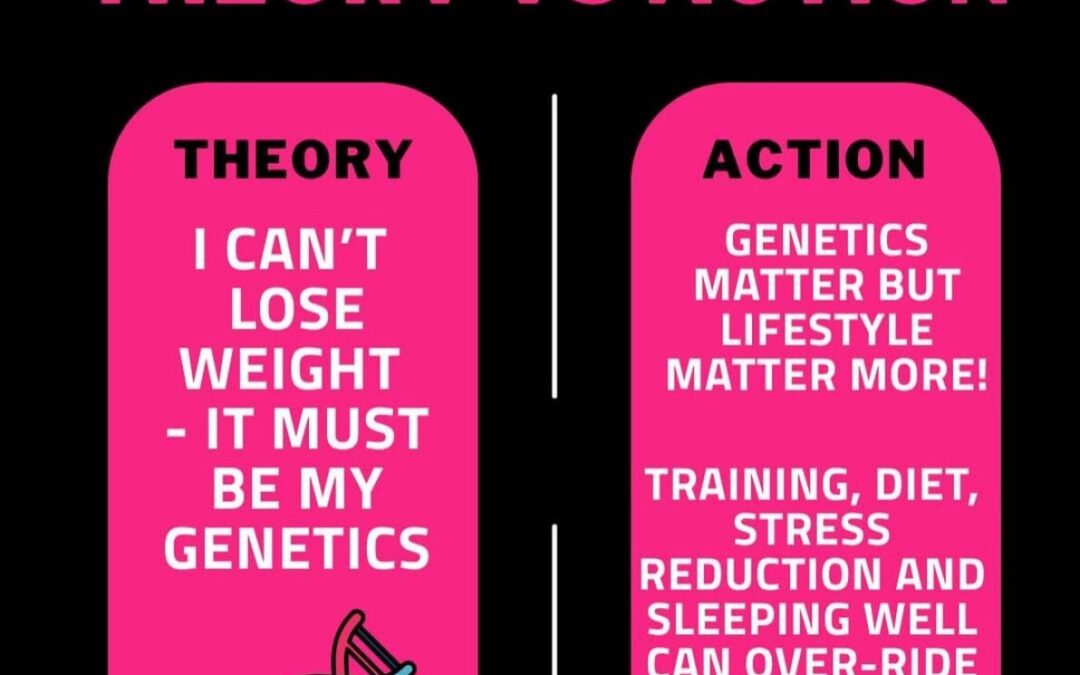We often hear people say things like “I’ve just got bad genetics” or “It’s easy for her — she’s naturally fit.”
And while your DNA does play a role in how your body looks, feels, and responds to training… it’s not the whole story.
Your genes might set the stage, but your choices — your training, nutrition, sleep, and mindset — decide the outcome.
Here are four key ways your genetics influence your fitness, and how much control you still have over each one 👇
1️⃣ Metabolism Matters
Your metabolism is essentially your body’s engine — the rate at which you burn calories just to stay alive.
Some people are naturally “fast burners,” meaning they use more energy even at rest. Others are “slow burners,” which means they need fewer calories to function. This difference often comes down to your DNA.
But here’s the good news: your metabolism isn’t fixed.
Regular exercise (especially strength and HIIT training), quality sleep, and eating enough protein can all boost your resting metabolism over time.
So even if you weren’t “born with a fast metabolism,” you can still train your body to become more efficient.
2️⃣ Fat Storage Patterns
Ever noticed how some people gain weight around their belly while others store it in their hips or thighs?
That’s largely genetic — your DNA helps determine where your body tends to store fat first.
However, how much fat you store comes down to lifestyle.
Your training, nutrition, and daily habits have a far bigger impact than your genetic blueprint.
Consistent exercise and balanced eating can help shift your body composition, even if you’re predisposed to carry fat in certain areas.
Your genes may influence your shape, but your habits sculpt the final result.
3️⃣ Appetite & Cravings
Do you feel like you’re always hungry, or struggle with certain cravings no matter how hard you try?
That might not be a lack of willpower — it could be in your genes.
Certain genetic variations can affect hunger hormones like leptin and ghrelin, which control appetite and satisfaction. Some people simply feel hunger more intensely or crave specific types of foods, especially sugar or carbs.
But again, awareness is power.
Once you understand your triggers, you can build routines that help — eating more protein and fibre, staying hydrated, and avoiding long gaps between meals can help regulate appetite and reduce cravings naturally.
4️⃣ Exercise Response
Here’s where it gets interesting — not everyone responds to the same workout in the same way.
Some people build muscle quickly, while others find it harder. Some see fast fat loss, others need more time.
That variation is partly genetic — it’s about how your body processes energy, builds muscle fibres, and recovers from exercise.
But consistency is the great equalizer.
Even if your progress feels slower, your body will adapt. The longer you train, the more your body learns to work efficiently — improving strength, endurance, and body composition regardless of your genetic makeup.
The Bottom Line
Your DNA may shape the playing field, but your habits decide the score. 💪
Genetics might explain why certain things feel easier or harder for you — but they don’t determine your destiny.
Train consistently, eat well, and focus on what you can control. That’s where the real transformation happens.

